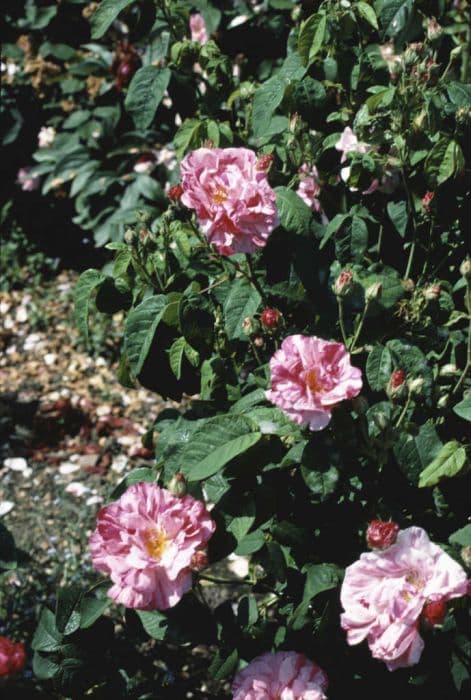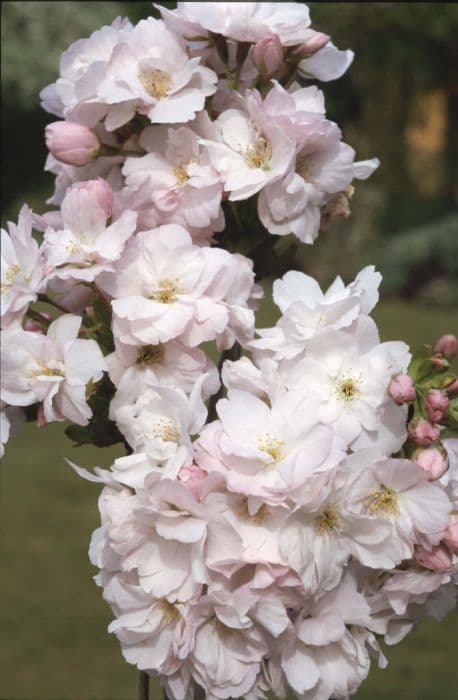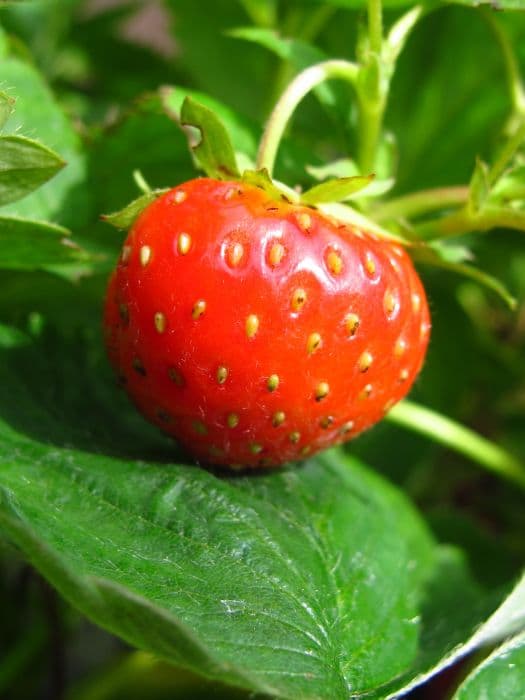Apple Malus domestica 'Bountiful' (C)
ABOUT
The 'Bountiful' apple tree is a fruit-bearing deciduous tree that's well-known for its attractive appearance throughout the seasons. In spring, it bursts into life with an impressive display of delicate white to pale pink flowers. Each flower has a central grouping of yellow stamens which adds a pop of color against the petals. As the seasons progress, these flowers develop into the fruit for which the tree is named. The apples are typically round and possess a smooth, shiny skin that may range from greenish-yellow to mostly red, often with a blend of both colors. The flesh inside is juicy and can vary in color from white to cream, offering a sweet to mildly tart flavor depending on the ripeness of the fruit. The leaves of the tree are a deep green color, oval-shaped with a pointed tip and finely toothed edges. They are typically arranged in an alternating pattern along the branches, which provides a dense canopy of foliage. The leaves provide a vibrant show in autumn, turning various shades of yellow, orange, or red before falling. The bark of 'Bountiful' apple tree is generally gray-brown and may exhibit a texture that ranges from smooth on younger trees to rough and fissured on older specimens. Overall, the tree offers both aesthetic appeal and practical fruit production, making it a popular choice for gardens where apple cultivation is desired.
About this plant
 Names
NamesFamily
Rosaceae.
Synonyms
Apple, Cultivated Apple, Domestic Apple.
Common names
Malus domestica 'Bountiful'
 Toxicity
ToxicityTo humans
Apple trees, including the 'Bountiful' variety, are not toxic to humans when it comes to the fruit they bear. However, the seeds found inside the apples contain amygdalin, which can release cyanide into the body when chewed and digested. Ingesting small amounts of apple seeds is generally not harmful because the human body can detoxify small amounts of cyanide. But consuming a very large number of seeds can lead to symptoms such as headache, dizziness, confusion, anxiety, vomiting, and even potentially to more serious conditions such as respiratory failure and coma due to cyanide poisoning.
To pets
Apple trees, including the 'Bountiful' variety, are also generally not toxic to pets when considering the flesh of the fruit; however, the seeds, stems, and leaves of apple trees can be harmful. Like in humans, the seeds contain amygdalin, which can release cyanide when digested. While pets are less likely to consume large quantities of seeds, they may be more susceptible to the toxins due to their smaller body sizes. Signs of cyanide poisoning in pets include panting, difficulty breathing, dilated pupils, and shock. If a pet ingests a large quantity of apple seeds or other parts of the apple tree containing amygdalin, it could potentially lead to serious health issues or even be fatal.
 Characteristics
CharacteristicsLife cycle
Perennials
Foliage type
Deciduous
Color of leaves
Green
Flower color
White
Height
10 feet (3 meters)
Spread
12 feet (3.6 meters)
Plant type
Tree
Hardiness zones
5
Native area
Asia
Benefits
 General Benefits
General Benefits- Aesthetic Appeal: Enhances the beauty of gardens with its blossoms and fruit.
- Shade Provision: Offers shade in gardens and outdoor spaces when mature.
- Fruit Production: Provides a source of edible apples for consumption and culinary use.
- Pollinator Attraction: Attracts bees and other pollinators, supporting local ecosystems.
- Seasonal Interest: Presents a seasonal display with spring flowers and autumn fruit.
 Medical Properties
Medical Properties- Antioxidant content: Apples from Malus domestica 'Bountiful' may contain various antioxidants such as vitamin C and flavonoids which help protect the body from oxidative stress.
- Dietary fiber: The high fiber content in apples can aid in digestive health and may help with constipation.
- Glycemic control: The soluble fiber in apples could assist in controlling blood sugar levels by slowing the absorption of sugar into the bloodstream.
- Cardiovascular health: The fiber and antioxidant compounds in apples may contribute to heart health by lowering cholesterol levels and preventing heart disease.
 Air-purifying Qualities
Air-purifying QualitiesThis plant is not specifically known for air purifying qualities.
 Other Uses
Other Uses- Wooden Furniture Polish: The juice from apples of Malus domestica can be used to make a natural furniture polish when mixed with vinegar and olive oil.
- Natural Dye: The skin and pulp of the apples can be boiled to create a natural dye for fabrics or crafts.
- Insect Trap: The fruit's sweet scent can attract and trap fruit flies when combined with vinegar and dish soap in a container.
- Mushroom Cultivation Medium: Chopped apple wood can serve as a growth medium for cultivating gourmet mushrooms.
- Apple Seed Necklaces: The seeds can be dried, painted, and strung into novel jewelry items like necklaces or bracelets.
- Stamping Craft: Halved apples can be used as stamps for children’s art projects by dipping the cut side in paint and pressing onto paper.
- Screen Cleaner: A cut apple can be used to clean dusty screens or monitors, as the fruit’s mild acidity helps remove grime.
- Fruit Bowl Freshener: Keeping an apple in a fruit bowl can help keep other fruits fresh longer due to the release of ethylene gas.
- Plant Growth Stimulant: Small amounts of apple juice can be added to water for houseplants as the natural sugars and minerals can stimulate plant growth.
- Potpourri Ingredient: Dried apple slices and peels can be incorporated into potpourri mixtures to add a pleasant, fruity aroma.
Interesting Facts
 Feng Shui
Feng ShuiThe Apple Tree is not used in Feng Shui practice.
 Zodiac Sign Compitability
Zodiac Sign CompitabilityThe Apple Tree is not used in astrology practice.
 Plant Symbolism
Plant Symbolism- Knowledge and Original Sin: As a type of apple tree, Malus domestica 'Bountiful' is often associated with the story of Adam and Eve in biblical tradition, where the fruit represents the forbidden knowledge and original sin.
- Fertility and Abundance: Apples are symbols of fertility and abundance, reflecting the tree's prolific nature and the generous bounty of its harvest.
- Eternal Life: In Norse mythology, apples are believed to grant eternal youthfulness, making the apple tree a symbol of immortality and rejuvenation.
- Love and Desire: The apple has a historical association with love and eroticism, which is reflected in its use in love divination practices and mythology.
- Peace and Harmony: Offering an apple is traditionally seen as a gesture of peace and reconciliation, a sign of goodwill and harmonious intentions.
 Water
WaterApple trees, such as the Bountiful variety, require consistent moisture, especially during the spring and summer growing seasons. Water young trees with about 5 to 10 gallons per week, increasing the amount during dry spells. Mature apple trees with deep root systems require less frequent watering, but more water per session, possibly around 15 to 20 gallons every two weeks if there's insufficient rainfall. It's essential to avoid over-watering, which can lead to root rot. The watering method should ensure that water reaches deep into the soil, near the tree's roots, rather than just wetting the surface.
 Light
LightApple trees, including the Bountiful variety, thrive in full sun, which means they need at least six hours of direct sunlight each day. The best spot for planting an apple tree is an open, unshaded area away from buildings or taller trees that might block the sun. The more sunlight the tree receives, the better it will grow and produce fruit.
 Temperature
TemperatureApple trees like the Bountiful variety prefer moderate climates and are hardy in a range of temperatures. They can tolerate winter cold down to around -20°F and summer heat up to about 90°F. However, the ideal growing temperatures for apple trees are between 60°F and 75°F, which promotes healthy growth and fruit development.
 Pruning
PruningPruning is vital for the Bountiful apple tree to maintain its health, shape, and to maximize fruit production. Pruning should be done during the dormant season, late winter or early spring, before new growth begins. Remove any dead, diseased, or crossing branches, and thin the canopy to allow sunlight and air to penetrate. Mature apple trees should be pruned annually to encourage the growth of new fruit-bearing wood.
 Cleaning
CleaningAs needed
 Soil
SoilApple trees like Malus domestica 'Bountiful' prefer a well-draining loamy soil with a pH between 6.0 and 7.0. A mix of garden soil, compost, and aged manure works well to foster healthy growth. Adding perlite or sand can improve drainage, essential for avoiding root rot.
 Repotting
RepottingApple trees, including the 'Bountiful' variety, do not typically get repotted as they are outdoor plants. Instead, they may be transplanted when young or grafted onto rootstock. Once established in the orchard or yard, they do not require repotting.
 Humidity & Misting
Humidity & MistingApple trees like 'Bountiful' do not have specific humidity requirements. They are adaptable to outside humidity levels typical of temperate climates and do well in open environments where humidity is not artificially controlled.
 Suitable locations
Suitable locationsIndoor
Not suitable for typical indoor growth; requires outdoor conditions.
Outdoor
Plant in well-draining soil, full sun, and protect from strong winds.
Hardiness zone
4-8 USDA
 Life cycle
Life cycleThe life cycle of the 'Bountiful' apple tree (Malus domestica 'Bountiful') begins with germination from seed, although for true cultivar replication, propagation from cuttings or grafting is preferred. Once established, the tree enters a vegetative stage, sprouting leaves, and developing a robust root system and sturdy trunk in its formative years. Flowering occurs in spring, with the tree producing fragrant white blossoms that are pollinated by insects, giving way to fruit development. Over the summer, the apple fruits grow and mature, typically ready for harvest in the late summer to early autumn. After fruiting, the tree prepares for dormancy, shedding its leaves in the fall and entering a period of winter rest. Every year, the cycle repeats, with the tree increasing in size and yield as it matures, capable of producing fruit for several decades.
 Propogation
PropogationPropogation time
Late winter-early spring
The most common method of propagating the Bountiful apple tree, which is a cultivar of Malus domestica, is through grafting. This technique involves taking a piece of a mature Bountiful apple tree, commonly referred to as a scion, and attaching it to a rootstock of another apple variety. The best time to graft apple trees is in late winter or early spring before the buds begin to swell. The scion, which contains buds of the Bountiful variety, is carefully joined with the rootstock, either through a cleft graft or a whip and tongue graft, ensuring that the cambium layers (the actively growing tissue just under the bark) of both the scion and the rootstock are aligned. The graft joint is then sealed with grafting wax or tape to prevent drying out and infection by pathogens. Over a few weeks to months, the tissues of the two parts will grow together, forming a strong union, after which the tape or wax can be removed, and the new Bountiful apple tree can continue to grow and eventually bear fruit typical of its variety.









